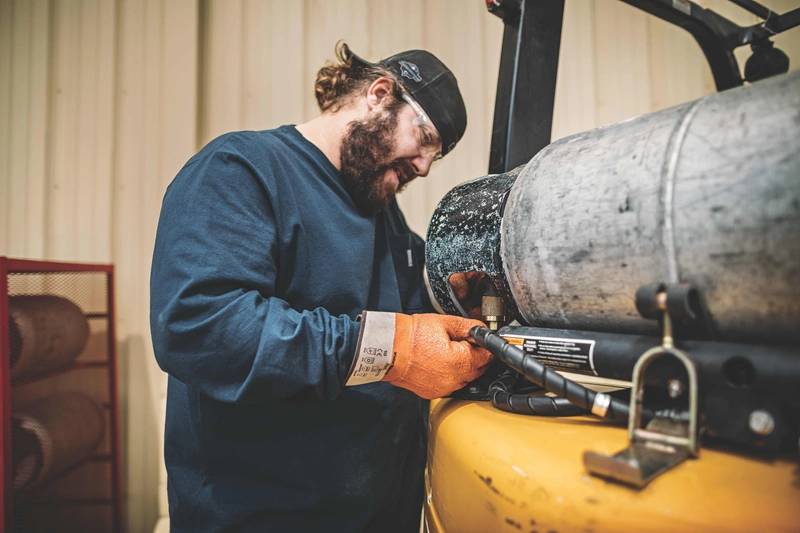Propane Cargo Handling Equipment Safety Tips
As the adoption of propane-powered equipment in ports continues to grow, implementing proper safety measures becomes more crucial.
Supply chain professionals throughout the country rely on cargo handling equipment (CHE) to keep containers, trailers, and other materials on the move. With rapidly changing conditions in a port, it’s important to keep operators abreast of important safety considerations when working with equipment like forklifts and port tractors.

Propane offers a clean, affordable, and safe energy solution for ports, powering marine vessels, generators, forklifts, port tractors, and other medium-duty vehicles. As the adoption of propane-powered equipment in ports continues to grow, implementing proper safety measures becomes more crucial. Here are the top safety tips for operating propane-powered equipment in port environments.
Forklift safety tips
Forklifts are among the most widely used pieces of equipment at inland and seaports, capable of moving containers both inside warehouses and out. Despite being so common, it’s important to keep these safety tips top-of-mind to avoid accidents:
- Complete a routine check of equipment before operating and notify management of any damages or problems. Keep forklifts free from oil and grease.
- Wear proper PPE such as hard hats, protective footwear, eye protection, and high-visibility clothing on the warehouse floor and while operating a forklift.
- Buckle up every time. This may seem obvious, but it’s one of the most important tips to remember. Overturned forklifts are one of the leading causes of forklift-related accidents.
- Move slowly and use the horn. When vision is obstructed, it’s easy to have a collision. Using the horn at every intersection will keep pedestrians and other operators safe.
- Know your forklift’s weight capacity. Weight capacity markings are there for a reason — to keep operators safe. Exceeding the weight capacity of a forklift significantly increases the risk of tipping.
- Lower, park, and set. When finished operating a forklift, it’s important to always lower the forks, use the parking brake, and set the controls to neutral. Safely parking the machine reduces the risk of unintended movement and injury. If parking on an incline, be sure to use wheel blocks to secure the machine further.
- Mind the ramp. Drivers should always carry a load pointing up an incline. If unloaded, keep the forks pointed downgrade.
- Inspect forklift fleets regularly. Regular maintenance helps prevent unnecessary damage to the equipment and keeps employees safe.
Propane cylinder safety
Beyond the basics of forklift safety, each energy source — whether propane, diesel, gasoline, or electric — has its own set of safety precautions. As a popular, safe, and powerful energy source for forklifts and other applications, it’s important for operators to safely handle and store propane cylinders.
- Inspect cylinders before operation. Check cylinders for rusting, dents, gouges, and leaks. Cylinders that show signs of wear or leaks shouldn’t be used and may need to be replaced, even if within the cylinder’s requalification date. Confirm the cylinder valve is closed before connecting.
- Use proper lift techniques to place a cylinder onto a piece of equipment. The cylinder should be carefully placed into the cradle so the cylinder pin enters the locating hole in the cylinder collar. Once properly situated, secure the cylinder by tightening the brackets and check for leaks using a leak detection solution.
- Secure the pressure relief valve on the cylinder. On forklifts, operators should check that the pressure relief valve fitting is roughly 180 degrees from the forklift’s locating pin.
- Firmly tighten the gas line to the service connection.
- Close the service valves on cylinders when not in use. This helps prevent potential injury around internal combustion engines and unintended fuel loss.
- Store propane cylinders in a secure rack or cage. The cylinders should be stored horizontally with the pressure relief valves in the uppermost position, and operators should use proper lifting techniques when removing cylinders from storage and placing into a cradle.
Propane autogas refueling
There are a variety of propane refueling configurations available for port terminals, including permanent, temporary, and mobile solutions. Most on-site refueling includes large capacity fuel storage tanks equipped with a pump, meter, and one or more dispensers. Propane is delivered straight to the port by a local propane supplier and in most cases, port authorities can purchase the equipment or lease it from the local propane supplier.
Propane autogas refueling equipment varies by manufacturer, each with its own safety recommendations. Therefore, it’s important to ensure operators receive adequate training. Fortunately, most suppliers offer refueling training to ensure operators stay safe on the job.
By working with your local propane supplier, port authorities can establish custom refueling systems and organize regular trainings to keep port operations running safely and efficiently.
